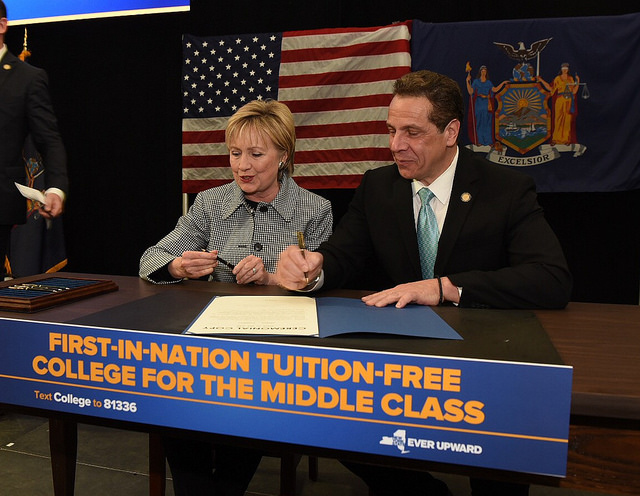Tuition-Free College Is Now a Reality in New York
New York Governor Andrew Cuomo’s radical idea for college just became a reality and could have a significant impact for many students currently thinking about where to go after graduation.
On April 12, joined by Hillary Clinton, Cuomo signed legislation enacting free tuition through the Excelsior Scholarship at all State University of New York (SUNY) and City University of New York (CUNY) schools for eligible students.
The groundbreaking program was first proposed in January, 2017.
The terms of the Excelsior Scholarship are as follows: families cannot make more than $125,000 per year; the student must be a full time student; and he or she must live in New York for three years after graduating college.
More than 940,000 families with college-age children in New York qualify for the program.
Based on enrollment projects done by the state of New York, the plan will cost about $163 million per year once fully developed and phased in.
Governor Cuomo said in the announcement, “a college education is not a luxury – it is an absolute necessity for any economic mobility,” later in life. New York is the first state to enact such a program.
A large part of what prompted Governor Cuomo to pass this proposal is to prevent college students from being terrorized with loans after they graduate. Student debt reached $1.2 trillion nationwide; Cuomo believes this scholarship will set a precedent for the rest of the country and draw more people to college because they will not have to worry about paying off crippling debt after graduating.
People who receive a college degree earn 66% more on average than people who do not. As Cuomo said, a college degree is quickly becoming a necessity, not a luxury.
Emily LeRolland ’17 is going to SUNY Stony Brook next year. Though the scholarship came too late to impact her, she is hopeful the program will live up to expectations.
“I think that right now there are a lot of restrictions, but they are also way ahead of many other states, so that is good,” LeRolland said. “I think that this will be successful in the long run.”
Marielle McHale is a senior from Clifton Park, NY. She lives in Mem West, and in her free time, she plays hockey and hangs out with her friends.











